Dupont Circle isn’t the capital city’s quintessential gay neighborhood that it once was.
“There’s still a gay community here, but they’re also in Logan Circle and Shaw,” said Georgia Katinas, manager of Annie’s Paramount Steakhouse, a longtime safe haven for the Circle’s queer residents since the 1950s. “All of the lesbians have moved to Takoma Park.”
But for one night a year, the queer community transforms the area into what it once was: an unabashed gayborhood.
After being sidelined by the COVID-19 pandemic last year, dozens of drag queens dusted off their stilettos and returned to the time-honored tradition of ‘crossing the line since 1986’ by participating in last nights 17th Street High Heel Race.
Spectators began to gather just after sundown, hoping to secure a spot on the soon-to-be packed street and get an early look at this year’s contestants. A stage near the starting line blasted Diana Ross’s “I’m Coming Out,” as a Carrie Bradshaw lookalike earned a cheer from onlookers as the drag queen strutted down the road and shouted ‘This is for ladies who brunch!’
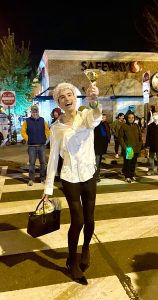
Hundreds of spectators crowded the streets of Dupont Circle to watch one of the city’s most unique events, wherein drag queens— dressed in costumes ranging from Princess Diana to Melania Trump to members of a fringe polygamist sect who made headlines in the early 2000’s— dart down a .1-mile stretch of raceway that between JR’s Bar & Grill and Annie’s.
Participants said that turnout for the race was slim compared to years past, but point to concerns about COVID-19 and a sudden change to cooler weather for the blame.
Nevertheless, positivity radiated off of those gathered to celebrate the tradition, held the Tuesday before Halloween each year.
The event’s original participants competed for a bottle of champagne, but for longtime competitors like Martin Moeller, many queens are racing for much more than alcohol.
“To some extent, it’s just having fun or dressing up,” said Moeller, who has participated in the event since its early years. “But I think it sometimes also has a political edge. It’s a way of expressing our identity through being ridiculous, being crazy, and making fun of ourselves at the same time that we make fun of other institutions that may find us distasteful.”
Moeller, who has lived in the Dupont Circle neighborhood with his husband for nearly two decades, said the event has shifted over the years from being predominantly queer-centric to entertaining straight attendees, which he says isn’t completely a bad thing.
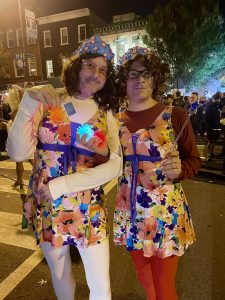
“If we can convince other people— straight, cisgender, whatever they may be— who haven’t experienced this kind of openness, then I think we’ve accomplished something,” said Moeller.
Today, Dupont Circle’s former hubs of gay nightlife, like Mr. P’s and Rascals, have been replaced by sports bars that label themselves as gay but appear to be predominantly occupied by bachelorette parties and millennial happy hours.
Dave Perruzza, former longtime manager of JR’s, said that while the race has straightened out some since it began, the neighborhood has changed entirely.
When the area was the District’s unequivocal center of gay life, its distinct gilded age manors housed LGBT organizations, each bar sponsored a popular drag show and coffee shops hosted support groups for those in the community battling HIV/AIDS.
“I think this race is the only thing, besides Annie’s, that still solidifies [17th street] as a gay street,” said Perruzza.
The Dupont Circle of yesterday lives on at Annie’s, where gay life is still as ubiquitous as it once was in the neighborhood.
On any given day, middle-aged and grey-haired gays crowd Annie’s iconic bar for a stiff drink from bartenders who have watched drag queens race in front of the restaurant for decades.
The steakhouse welcomes customers in the neighborhood regardless of their sexual orientation, but Katinas said the James Beard Award-Winning restaurant doesn’t plan on swapping out its rainbow bunting anytime soon.
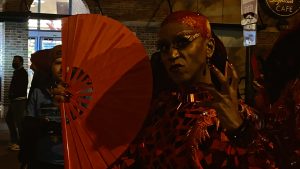
“Even though as a society we’re more commingled, I think it’s still really nice to have places where you can walk in, look around, and say, ‘Oh, I’m not alone. I’m not the only one,” said Katinas, whose family has operated the business on 17th street since 1948.
The race, held the Tuesday before each Halloween, was organized by volunteers until 1999, when Perruzza became the event’s chief organizer— a momentous, and unpaid task.
In preparation for the race each year, Perruzza said he was tasked with securing permits from the city, organizing with law enforcement, and recruiting more than 150 volunteers, in addition to executing the event and its clean-up.
“For me, it was a nightmare,” said Perruzza.
The challenge of pulling off the glittery tradition grew as hopeful competitors multiplied and spectators reached the thousands.
When Perruzza stepped down from his longtime managerial position at JR’s Bar & Grill to open Pitchers and A League of Her Own in nearby Adams Morgan in 2018, the event became a production of the city government— a change he said was necessary for the race’s survival.
“I got a lot of s—- for giving the event to the mayor,” said Perruzza. “When I left, there was no one who was going to do all of the work I did because I didn’t get paid for it… the only way this event could continue to go on is if the mayor’s office took over.”
But Katinas said it’s keeping traditions like the 17th Street High Heel Race alive and preserving businesses like Annie’s that help the neighborhood maintain its distinct identity.
“This isn’t necessarily the gayborhood anymore,” said Katinas. “It’s different now, so it’s nice to have anchors of the place where LGBTQ people will always feel welcome and that they’re always going to feel like 17th street is a place for them.”
The Circle has always revolved around cultural movements— ranging from war resisters to Black Power activists to homosexuals yearning to live in the light— and it will continue to turn, a 360-degree rotation of the country’s social fabric in one neighborhood in the nation’s capital.
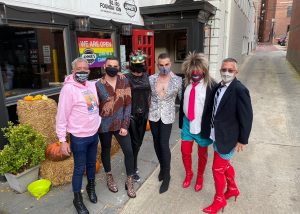
Though it’s changed, Perruzza still attends the event, Moeller continues to participate and Katinas said Annie’s employees cherish the High Heel Race so much, they did an impromptu six person dash in front of the restaurant last year in honor of the event after it was canceled in the throws of the pandemic.
In part, this is because the race still serves a purpose— and it’s a hell of a lot of fun to run in heels.
“We’re getting these people to loosen up and to get a laugh and realize, you know, we’re not a freak show,” said Moeller. “If you’ve grown up LGBT in this country, you probably have survived because you were able to loosen up a bit, I know that’s true for me.”


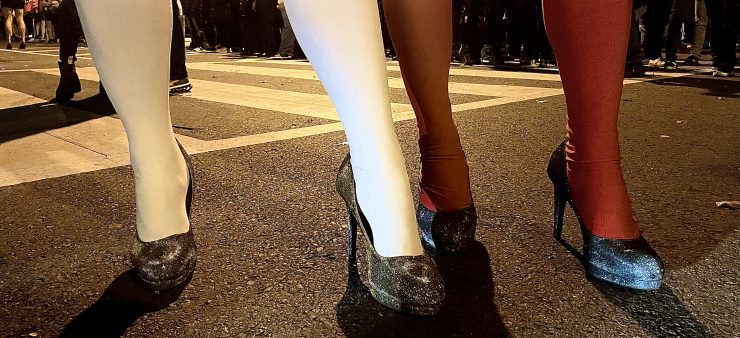
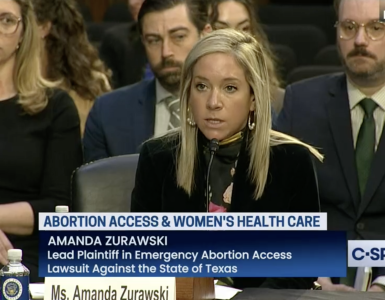

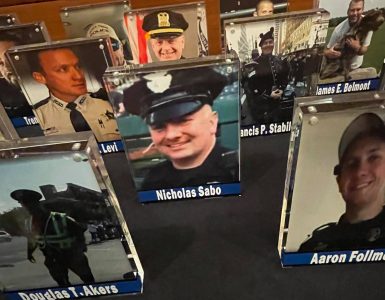


Add comment